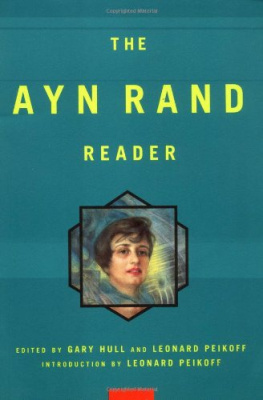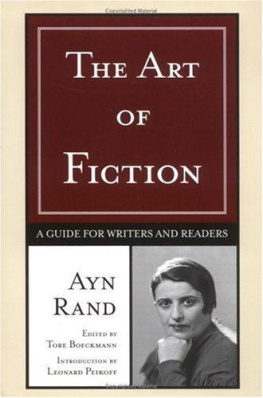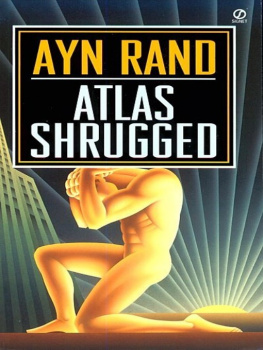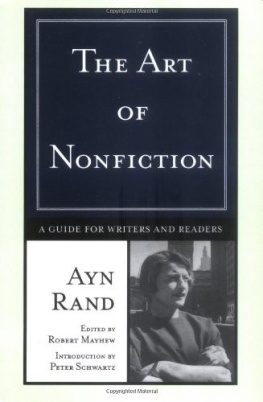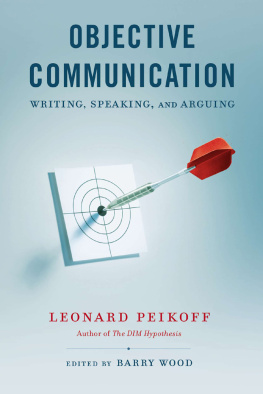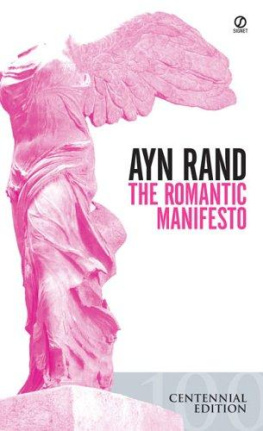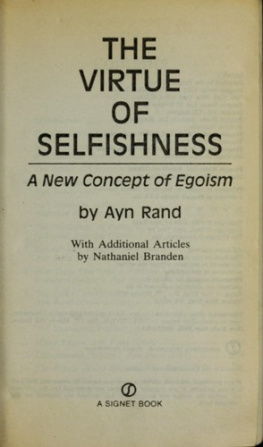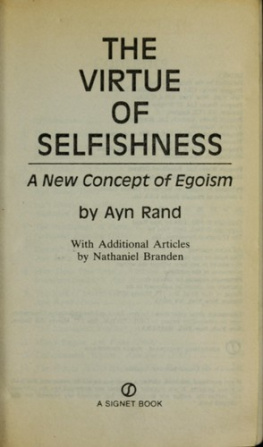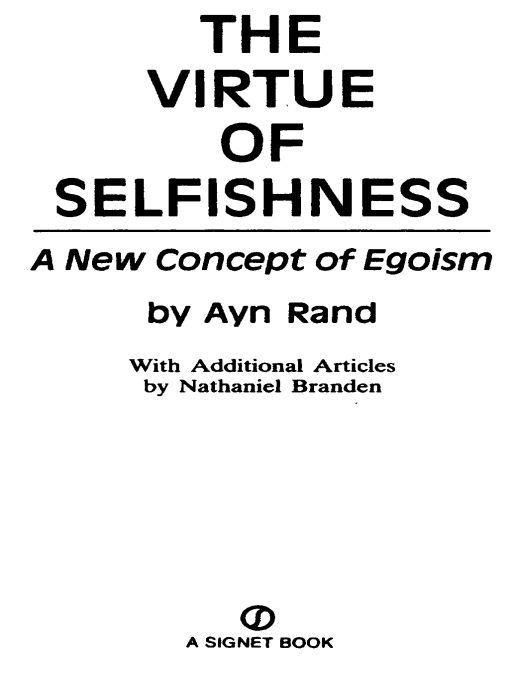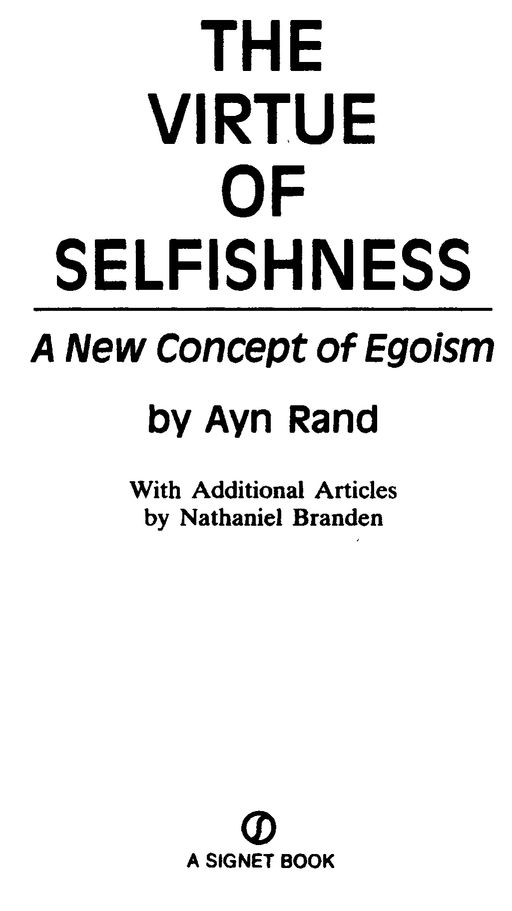Table of Contents
THE VIRTUE OF SELFISHNESS
Ethics is not a mystic fantasynor a social conventionnor a dispensable, subjective luxury.... Ethics is an objective necessity of mans survivalnot by the grace of the supernatural nor of your neighbors nor of your whims, but by the grace of reality and the nature of life.
The Objectivist ethics proudly advocates and upholds rational selfishnesswhich means: the values required for mans survival qua manwhich means: the values required for human survivalnot the values produced by the desires, the feelings, the whims or the needs of irrational brutes, who have never outgrown the primordial practice of human sacrifices.
Ever since their first publication, Ayn Rands works have had a major impact on the intellectual scene. Her new moralitythe ethics of rational self-interestchallenges the altruist-collectivist fashions of our day. Known as Objectivism, her unique philosophy is the underlying theme of her famous novels.
MORE WRITINGS BY AYN RAND
FICTION
WE THE LIVING
THE EARLY AYN RAND
NIGHT OF JANUARY 16TH
PHILOSOPHY
General
OBJECTIVISM: The Philosophy of Ayn Rand
by Dr. Leonard Peikoff
THE AYN RAND LEXICON
THE AYN RAND READER
PHILOSOPHY: Who Needs It?
THE VOICE OF REASON
FOR THE NEW INTELLECTUAL
THE OMINOUS PARALLELS by Dr. Leonard Peikoff
THE VIRTUE OF SELFISHNESS
Epistemology
AN INTRODUCTION TO OBJECTIVIST EPISTEMOLOGY
Politics / Economics
CAPITALISM: The Unknown Ideal
RETURN OF THE PRIMITIVE
Art, Literature & Letters
THE ROMANTIC MANIFESTO
THE ART OF FICTION
THE ART OF NONFICTION
JOURNALS OF AYN RAND
LETTERS OF AYN RAND
Available wherever books are sold or at
penguin.com
Introduction
The title of this book may evoke the kind of question that I hear once in a while: Why do you use the word selfishness to denote virtuous qualities of character, when that word antagonizes so many people to whom it does not mean the things you mean?
To those who ask it, my answer is: For the reason that makes you afraid of it.
But there are others, who would not ask that question, sensing the moral cowardice it implies, yet who are unable to formulate my actual reason or to identify the profound moral issue involved. It is to them that I will give a more explicit answer.
It is not a mere semantic issue nor a matter of arbitrary choice. The meaning ascribed in popular usage to the word selfishness is not merely wrong: it represents a devastating intellectual package-deal, which is responsible, more than any other single factor, for the arrested moral development of mankind.
In popular usage, the word selfishness is a synonym of evil; the image it conjures is of a murderous brute who tramples over piles of corpses to achieve his own ends, who cares for no living being and pursues nothing but the gratification of the mindless whims of any immediate moment.
Yet the exact meaning and dictionary definition of the word selfishness is: concern with ones own interests.
This concept does not include a moral evaluation; it does not tell us whether concern with ones own interests is good or evil; nor does it tell us what constitutes mans actual interests. It is the task of ethics to answer such questions.
The ethics of altruism has created the image of the brute, as its answer, in order to make men accept two inhuman tenets: (a) that any concern with ones own interests is evil, regardless of what these interests might be, and (b) that the brutes activities are in fact to ones own interest (which altruism enjoins man to renounce for the sake of his neighbors).
For a view of the nature of altruism, its consequences and the enormity of the moral corruption it perpetrates, I shall refer you to Atlas Shruggedor to any of todays newspaper headlines. What concerns us here is altruisms default in the field of ethical theory.
There are two moral questions which altruism lumps together into one package-deal: (1) What are values? (2) Who should be the beneficiary of values? Altruism substitutes the second for the first; it evades the task of defining a code of moral values, thus leaving man, in fact, without moral guidance.
Altruism declares that any action taken for the benefit of others is good, and any action taken for ones own benefit is evil. Thus the beneficiary of an action is the only criterion of moral valueand so long as that beneficiary is anybody other than oneself, anything goes.
Hence the appalling immorality, the chronic injustice, the grotesque double standards, the insoluble conflicts and contradictions that have characterized human relationships and human societies throughout history, under all the variants of the altruist ethics.
Observe the indecency of what passes for moral judgments today. An industrialist who produces a fortune, and a gangster who robs a bank are regarded as equally immoral, since they both sought wealth for their own selfish benefit. A young man who gives up his career in order to support his parents and never rises beyond the rank of grocery clerk is regarded as morally superior to the young man who endures an excruciating struggle and achieves his personal ambition. A dictator is regarded as moral, since the unspeakable atrocities he committed were intended to benefit the people, not himself.
Observe what this beneficiary-criterion of morality does to a mans life. The first thing he learns is that morality is his enemy; he has nothing to gain from it, he can only lose; self-inflicted loss, self-inflicted pain and the gray, debilitating pall of an incomprehensible duty is all that he can expect. He may hope that others might occasionally sacrifice themselves for his benefit, as he grudgingly sacrifices himself for theirs, but he knows that the relationship will bring mutual resentment, not pleasureand that, morally, their pursuit of values will be like an exchange of unwanted, unchosen Christmas presents, which neither is morally permitted to buy for himself. Apart from such times as he manages to perform some act of self-sacrifice, he possesses no moral significance: morality takes no cognizance of him and has nothing to say to him for guidance in the crucial issues of his life; it is only his own personal, private, selfish life and, as such, it is regarded either as evil or, at best, amoral.
Since nature does not provide man with an automatic form of survival, since he has to support his life by his own effort, the doctrine that concern with ones own interests is evil means that mans desire to live is evilthat mans life, as such, is evil. No doctrine could be more evil than that.
Yet that is the meaning of altruism, implicit in such examples as the equation of an industrialist with a robber. There is a fundamental moral difference between a man who sees his self-interest in production and a man who sees it in robbery. The evil of a robber does not lie in the fact that he pursues his own interests, but in what he regards as to his own interest; not in the fact that he pursues his values, but in


